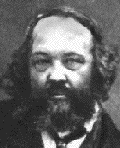Man's Rights? |  |
Revolutionary Catechism Published 1866 |
Part III.
Freedom is the absolute right of every adult man and woman to seek no other sanction for their acts than their own conscience and their own reason, being responsible first to themselves and then to the society which they have voluntarily accepted.
Part IX. H. Individual Rights
- The right of every man and woman, from birth to adulthood, to complete upkeep, clothes, food, shelter, care guidance, education ..., all at the expense of society
- The equal right of adolescents, while freely choosing their careers, to be helped and to the greatest possible extent supported by society. After this, society will exercise no authority or supervision over them except to respect, and if necessary defend, their freedom and their rights.
- The freedom of adults of both sexes must be absolute and complete, freedom to come and go, to voice all opinions, to be lazy or active, moral or immoral, in short, to dispose of one's person or possessions as one pleases, being accountable to no one. Freedom to live, be it honestly, by one's own labor, even at the expense of individuals who voluntarily tolerate their exploitation.
- Unlimited freedom of propaganda, speech, press, public or private assembly, with no other restraint than the natural salutary power of public opinion. Absolute freedom to organize associations even for allegedly immoral purposes including even those associations which advocate the undermining (or destruction) of individual and public freedom.
- Freedom can and must be defended only by freedom: to advocate the restriction of freedom on the pretext that it is being defended is a dangerous delusion. As morality has no other source, no other object, no other stimulant than freedom, all restrictions of liberty in order to protect morality have always been to the detriment of the latter. ...
- Society cannot, however, leave itself completely defenseless against vicious and parasitic individuals. Work must be the basis of all political rights. The units of society, each within its own jurisdiction, can deprive all such antisocial adults of political rights (except the old, the sick, and those dependent on private or public subsidy) and will be obliged to restore their political rights as soon as they begin to live by their own labor.
- The liberty of every human being is inalienable and society will never require any individual to surrender his liberty or to sign contracts with other individuals except on the basis of the most complete equality and reciprocity. Society cannot forcibly prevent any man or woman so devoid of personal digtnity as to place him- or herself in voluntary servitude to another individual; but it can justly treat such persons as parasites, not entitled to the enjoyment of political liberty, though only for the duration of their servitude.
- Persons losing their political rights will also lose custody of their children. Persons who violate voluntary agreements, steal, inflict bodily harm, or above all, violate the freedom of any individual, native or foreigner, will be penalized according to the laws of society.
- ... ? ...
- Individuals condemned by the laws of any and every association (commune, province, region, or nation) reserve the right to escape punishment by declaring that they wish to resign from that association. But in this case, the association will have the equal right to expel him and declare him outside its guarantee and protection.
